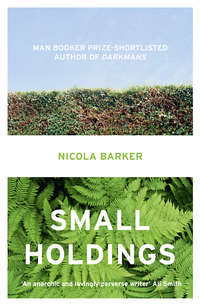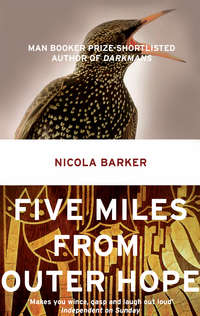
Полная версия
In the Approaches
It was a white rabbit with pink eyes. I walked all the way home with it held in a makeshift sling fashioned out of my jacket. Even now I find it incredible to think that I would have walked all that way with it. I am no fan of small mammals. I have given it a temporary berth in the bath. In the bath the enamel turns its white fur a yellower hue. Strange how the act of comparison can suddenly transform one clearly defined object into something else altogether. Life has a nasty habit of doing that.
I noticed that there was a tiny hole in the bathroom window. Later on I found an even tinier stone in the toilet bowl.
But that was not all I found. Oh no. The bin, the missing bulb, the hole in the window (all serious, in their own way, admittedly) were as nothing by comparison (that rabbit in the bath phenomenon, remember?) with the thing I found in my bedroom. I say ‘thing’, but it was more than a mere ‘thing’, it was a performance, a staging, an extravaganza. It was a complete one-act drama. I hate to oversell it, but … come with me. Enter the room. Push open the door and then grimacingly recoil. There is a smell … Not even a smell, a stink, a vile, ungodly odour. Something so foul, so rank, that mere words – simple, uncomplicated language – cannot do justice to its offensiveness. A slap in the face. A physical reaction. A gut reaction. A violent recoil. An existential shudder. A withering of the soul. A shrinking. A boring at the nostril. A tearing at the throat.
But where? From whence doth this rancid odour hail, pray tell? (I’ve fallen into Olde English in a pathetic attempt to try and encompass how primordial this smell is, how primitive, how base, how … how medieval – and how fearful I am, how confused, how repulsed; but still pretending, nevertheless, to be bold, pretending to be jocular; call to mind, if you must, a cheery fifteenth-century soldier – a Man of Fortune – or, better still, a palsied whore or cocky jester.) I search the room, a shirt over my face. My forehead is instantly dripping with sweat. My hand is a claw. I am a zombie. My body is panicking. It’s instinctive. The smell is so … so engulfing.
Eventually I settle on my suitcase, my empty suitcase (old leather, a gift from my maternal grandfather when I went up to Cambridge). It lies under the bed. I drag it out by its handle. I am so full of dread. Hands shaking. Palms wet. I steady myself. My heart is pounding. One, two, three – Come on, Franklin! Grow some balls, man! – I throw open the lid.
NNNAAAAARRRRGGHHHH!
So much worse – so, so much worse – than I could possibly have anticipated! Several hundred huge, buzzing bluebottles swarm out of the case and into my face. It is as though the devil himself (I’m an atheist, but bear with me) has been compressed in that small space. And now he is free. And he is angry. The sound! The intensity of that roar! The violence of those wings! The sense of un … un … unexpurgated filth! And remaining? In the case? The putrefying corpse of a dead shark. A dead sand shark, no less.
Urgh!
Urgh!
I vomited – instantly, spontaneously – on to my own, damp lap.
The sheer indignity!
Words cannot do justice. No. No. Sometimes, even justice – even justice – cannot do justice.
8
Miss Carla Hahn
I am trapped (a pathetically bleating shrew dangling from a savage hawk’s bloodied talon) in the midst of a polite exchange with the indomitable Bridget ‘Biddy’ West, who is manning the Post Office counter in the Fairlight General Store (Biddy: ‘So how many metres of garden did you say you have left, now, Carla?’ Me: ‘Uh … Eight? Nine? I’m not very metric. Eleven or twelve good strides from the back door.’ Biddy: ‘The shed was quite some distance away from the property, then?’ Me: ‘There’s an old extension out back. A sun room that Tilda – the owner, Tilda Gower – closed in with a little pine-wood sauna. It’s … The bungalow is basically just a series of tiny extensions, one next to the … uh … to the … uh … other.’ Biddy: ‘So you’ve told Matilda about the landfall?’).
At this (let’s call it the second ‘uh …’ moment) I am horrified to espy the giant bulk of Clifford Bickerton (previously observed, minutes earlier, driving his van – at considerable speed – towards Hastings on the Fairlight Road) blocking all the light from the windows in the door.
Bugger, bugger, bugger! I was certain I’d got away with it this time! I’d been so careful, so stealthy (had even jumped behind a buddleia to be 100 per cent sure)! Has he been – is he – following me again? Why oh why didn’t I just answer his calls and have done with it? Why didn’t I just speak to him directly when he came to the bungalow the other afternoon, in person, to offer help? Oh bugger, bugger, bugger.
The bell cheerfully tinkles as the door is pushed open and Clifford squeezes himself inside like some huge, red otter gently violating a disused vole hole. Whenever Clifford Bickerton enters any environment constructed for standard human habitation an atmosphere far more appropriate to a Grimm’s fairy tale is promptly established. He is big, powerful, tall, auburn-haired and bushy-bearded with hands like pitchforks and feet like hams. He has been uniquely fashioned for the barn and for the field.
‘So you’ve told Matilda about the landfall?’ Biddy repeats, ignoring the placid and unassuming Clifford completely.
‘Uh …’ I am thrown into confusion, ‘Yes. No. That’s … that’s actually why I’m sending this letter.’
I point towards the letter which I am currently buying stamps for as Clifford smacks his head into the light fitment and quietly curses.
‘You couldn’t ring her?’
Biddy continues to ignore Clifford.
‘No. She’s still travelling.’
‘The Great Wall?’
I nod. ‘She has an itinerary. Her next official pit-stop is somewhere called Huanghua. But she’s been delayed by an infected mosquito bite on her heel. Every few months I receive a letter …’
Clifford is currently inspecting the rack of cellophane and Sellotape. He picks up a packet of Blu-Tack. He seems deeply engrossed in the writing on the back.
‘Is that her name in Chinese, then?’ Biddy wonders, indicating the top line of the address.
‘No. I think it says something like … uh … “to the crazy, European lady traveller who is walking the Great Wall. I humbly ask that you – the wall guard at Huanghua – please keep this letter for her until she arrives, when she will reward you generously for your kindness. A thousand blessings …” All very flowery and Chinese. I don’t know, exactly … something like that, anyway. She sends me her next contact address enclosed in each letter so I can just cut it out and glue it on to an envelope.’
‘Oh.’ Biddy nods.
‘It’s all fairly hit and miss,’ I continue (suddenly compelled – through guilt and embarrassment – to blather on, inanely). ‘The wall’s over five thousand miles long. Although Tilda seems to think it’s even longer than that. In her last postcard she said she’d recently met someone – a Chinese historian or a geographer – who told her that the wall originally spanned over fifteen thousand miles …’
‘I simply don’t understand why Matilda bothered buying that bungalow in the first place if she never had any plans to live in it,’ Biddy sighs, taking the letter from me and dropping it on to the scales.
‘No.’
Clifford has now moved on to the rack of birthday cards.
‘Although I suppose it gives you a roof over your poor head,’ she kindly concedes, ‘so you can rent out your little cottage in Pett and don’t need to be getting under the feet of your dear old dad.’
‘Yes.’ I nod (concerned that she might be confusing my reassuringly tough head or my utterly incorrigible father with someone else’s head – someone else’s dad – far more deserving than mine).
‘Have you ever actually lived in the cottage since you inherited it?’ she wonders.
‘Uh. No, no. I’ve always been committed to—’
‘Someone’s birthday?’ Biddy raises her voice to finally acknowledge Clifford.
Clifford is inspecting a card very closely. He is so engrossed that he doesn’t seem to hear her.
‘SOMEONE’S BIRTHDAY, RUSTY?’ Biddy bellows.
Clifford’s entire body jolts with surprise. He drops the card then bends down to pick it up, inadvertently bumping into a wicker basket containing bags of kindling.
‘Mine,’ he says, then, ‘Sorry,’ (to the basket).
‘Yours?’ Biddy scowls.
Clifford clumsily retrieves the card.
‘The day before yesterday.’ Clifford nods.
(Oh God! The day of the landslip! I have forgotten Clifford’s birthday again, dammit!) ‘It’s visible from space,’ he adds, as a somewhat lacklustre afterthought, ‘the Great Wall.’
‘Happy birthday for … for …’ I start to murmur, agonized.
‘Are you planning on getting yourself a card, Rusty?’ Biddy wonders, with a supercilious smirk.
‘Uh … no.’
Clifford puts the card back down on to the rack.
‘Thank you,’ he mutters.
‘Because you’re two days late!’ Biddy delivers her ringing punch-line with considerable pizzazz.
‘I was actually just after some … uh … matches.’ Clifford grabs a pile of kindling and then moves over towards the ‘shop’ section of the store. There he grabs a packet of Tuc biscuits and proceeds to the counter which is currently vacant because Biddy is in the P.O.
Biddy snorts, amused, then checks the weight of my letter on her scales and inspects her list of foreign postal prices.
‘I’d be scared stiff to go to bed at night,’ she murmurs, neatly tearing a small selection of stamps from their sheets, ‘I mean you can never be sure. A bit of heavy rain and the clay just … it just slips. And there goes your home! Off a cliff! A high cliff! Into the sea! Everything you own – everything you’ve worked for – all gone! Kaput!’
‘And an airmail sticker, please,’ I remind her.
‘Poor Dr and Mrs Bassett lost the best part of their front kitchen. She said they found the cat in a cupboard almost half-dead with fear.’
‘They were up most of the night calling for it.’ I nod.
‘For the life of me I don’t know why the council doesn’t do more to enforce the demolition order,’ she tuts.
‘Tilda’s place is still perfectly livable,’ I interrupt, ‘and the Bassetts haven’t actually occupied the front kitchen since the last big drop …’
‘You’re all nutty as fruitcakes!’ Biddy mutters, pushing over the stamps and the sticker. ‘That’s two pounds and seventy pence please, Carla.’
I pass her the money, then quickly affix the stamps.
‘Well I suppose we should all just be grateful that nobody was actually hurt on this occasion,’ she concedes, generously.
‘Yes. We should. We are. Thanks.’
‘Although it’s only a question of time if you ask me,’ Biddy persists. ‘There’s no point fighting against nature, Carla. I say that as someone who spent much of their childhood in India – Bangladesh as it now is. The Indians respect Mother Nature. Don’t have any other choice. They know, first-hand, what she’s capable of.’
She hands me my change.
‘I’m sure that’s very true,’ I concede, limply (and I am, too).
Without prior warning, Biddy’s disapproving radar suddenly shifts focus and is now centred on the hapless Clifford.
‘Enjoying that, are we, Rusty?’ she demands, scowling.
Clifford has idly picked up a copy of the local paper from the shop counter and is blankly perusing the front page. He quickly throws it down with a stuttered, ‘Nnn … n … no!’
(Biddy, who was once the headmistress of our local primary school, traumatized several generations of small children with her searching questions, her piercing looks and her perpetual air of slight disapproval until a stubborn hip injury put an end to her reign of terror in 1978 or thereabouts.)
I turn for the door, muttering my thanks, but Biddy stops me in my tracks.
‘Shall I put that in the post-bag?’ she asks, reaching out for the letter. I hand it over, somewhat regretfully (it never feels like you’ve actually sent a letter until it’s been shoved into the hungry mouth of a bright, red postbox. Oh well).
I thank Biddy again and start for the exit. I am actually through the door (jingle-jingle!) and halfway across the little car park before Clifford finally catches up with me, as he inevitably must.
‘I left my stuff on the counter,’ he pants. He is still holding the Tuc biscuits.
‘You’ve still got the Tuc biscuits,’ I observe.
‘Damn.’
Clifford inspects the Tuc biscuits, foiled.
‘You’d better go back in,’ I caution him, ‘or Biddy will eat you alive.’
‘Yes.’ He nods, not moving.
I am about to go on to apologize for not responding to his calls (and his visit etc.) when I can’t help but notice the new jumper he’s wearing, partially hidden under his scruffy, khaki work coat. It’s a pure horror: a fashionable Pringle; pale yellow in the main, the front a vile knitted patchwork of interconnected pink, white and mauve diamonds.
I instinctively wince. ‘Birthday present?’ I ask.
‘Alice.’ He nods. ‘She was so pleased with it – cost her almost a week’s wages. I just didn’t have the …’
‘Does it fit properly?’
I push back the frayed sleeve of his work coat and pull away, worriedly, at the cuff. There’s not so much as a millimetre of give.
‘It’s a bit snug,’ he concedes.
‘Isn’t that interfering with your circulation?’ I wonder.
‘I have no feeling in my hands,’ he confirms.
‘Can you actually get it off?’
‘Nope,’ he sighs. ‘It’ll tear when I do. So I’m just keeping it on for as long as I possibly can.’
‘I did that with a sticking plaster once after a polio injection at school,’ I fondly reminisce, ‘and I developed blood poisoning.’
‘I remember.’ He nods.
‘How high can you lift your arms?’
With considerable difficulty he lifts them to a 65-degree angle.
‘There are two tiny holes at the armpit and the elbow,’ he explains, ‘which have allowed a certain amount of flexibility.’
‘You need to get it off, quick,’ I warn him. ‘Isn’t it difficult to breathe?’
‘I feel entombed’ – he nods – ‘like an Egyptian mummy. Although it’s fine,’ he rallies, ‘so long as I don’t over-exert myself.’
‘But what if you get a call out for the lifeboat?’ I demand.
He shrugs.
‘There are little marks on the side of your neck,’ I observe, with increasing concern, ‘little welts. It’s like …’ I shudder. ‘It’s like an expensive, lambswool python has swallowed you up, whole.’
‘I tried to get it off this morning,’ he confesses, ‘but I couldn’t do it by myself. I knew if I asked Mum or Dad or Bill it’d get straight back to Alice in a flash. They all think it’s bloody hilarious.’
‘Gracious me!’ I stare at the welts on his neck, somewhat daunted (almost as if they aren’t friction burns at all, but tender little love bites). ‘You must really care for her,’ I reason, jolted, ‘to put yourself through all this discomfort just for the sake of not … for the sake of … for a jumper. And such a – I mean I hope you don’t mind my saying so – but such a … a …’
I don’t have the heart to say it out loud.
‘Yes.’ He looks suitably crestfallen at the notion. ‘We’ve been engaged for eight years now. I suppose I must probably feel something.’
(Clifford and Alice, a local milkmaid, were engaged after she proposed to him, in 1976, a leap year, and he was just too kind to say no. At least that was always his version of events. Alice plays the scene quite differently, by all accounts.) I nod. Now it’s my turn to look crestfallen. I decide to take it on the chin, though, and promptly rally. I draw a steadying breath and strengthen my resolve. I know that the worst thing I could possibly do under these particular circumstances would be to offer Clifford any form of assistance.
No. I shan’t. I shall not. I will not – must not, definitely not – offer Clifford Bickerton any kind of help. I must never help Clifford Bickerton, and I must never receive help from Clifford Bickerton.
Oh, but the urge to offer help is so … so natural, so instinctive, so spontaneous, so … so …
No. No! No help, Carla. No offers of help! None.
‘Go and pay for the biscuits,’ I promptly tell him, ‘then pop around to the bungalow. I can’t possibly leave you like this. I have a pair of shears … Uh …’ I pause, scowling. ‘At least I did have a pair of shears …’
‘In the shed?’ he asks, almost tender (I suppose men will feel emotional about outbuildings).
I nod. ‘I do have some kitchen scissors, though,’ I persist.
His face lights up. It lights up. Every pore and auburn whisker is suffused with joy.
No! No, Carla! Bad Carla! Mustn’t. Offer. Help.
Will. Not.
I. Must. Not.
No. Help.
None!
Ten minutes later and he is kneeling on the worn kitchen lino and I am brandishing the scissors in front of him.
‘Sure you’re all right with this?’
‘Yup. Do it.’ He braces himself.
I kneel down beside him and gently slide the bottom blade of the scissors under the right-hand side of the jumper’s collar.
‘Stay very still,’ I instruct him, leaning in closer. It is difficult to find the correct angle and draw the blades together without resting my lower arm and wrist against his leonine neck and cheek. Ah, and there’s that all too familiar ‘Clifford smell’ of candle wax, sleeping puppies and engine grease! A lovely smell. The smell of industry and loyalty and good intent.
‘Your Tikhomirov study of the birches is on the floor,’ Clifford quietly observes.
‘Uh … Sorry?’ I re-focus.
‘Your painting of the birch trees …’ he repeats.
‘Oh. Yes. Of course. It fell down. During the landslip. It was the only casualty inside the house. The bottom of the frame snapped.’
‘I remember the day you bought that.’ He smiles tenderly at the memory.
‘Yes.’
I adjust my arm, frowning, and start to cut. The jumper curls away beneath my hand on both sides like two obliging slithers of apple peel. The trusty old vest below has – to its eternal credit – somehow managed to stay intact.
‘I’ll fix it if you like,’ Clifford volunteers, ‘the frame.’
‘It’s fine,’ I insist, ‘I can do it myself. Some strong glue …’
‘Oh. Okay.’ He is slightly hurt yet resigned.
‘I still love it. I still love birch trees,’ I muse. ‘Berezka. Beautiful Berezka. I don’t know why, they just make me feel so … so …’
‘Russian,’ he murmurs.
I start.
‘I really like all your new propaganda posters …’ He inspects the busy walls, thoughtfully, his eyes pausing on an early ‘Liberated Women Build up Socialism!’ poster which features a wholesome Russian peasant girl brandishing a pistol. Next to it the ‘Think About Those Who Are Starving!’ poster in blue and black with a loaf, cup, bowl and ominous, pointing hand.
‘I’ve been using them as a cheap way of covering up all the stains on the old wallpaper,’ I explain, ‘although they’re way too good for a kitchen, really—’
‘I see your collection of Russian lacquered boxes has increased a fair bit since I last visited,’ he interrupts, flexing his chest as the scissors finally break through the jumper’s waistline. ‘And the Soviet china figurines …’ He tips his head towards the old dresser. ‘Is that a new Lomonosov Chow?’
‘Uh …Yes. I found it wrapped up in a big box of Uzbek fabrics. In an antique shop near Hythe … D’you think you might manage to pull it off manually from here?’
Clifford tries to yank the jumper from his shoulder but his arms are still stiff and he has no luck.
‘Shall I cut down the back?’
He nods and shuffles around, obligingly.
‘Has Shimmy been to visit you here lately?’ he wonders.
‘Shimmy?’ I pause, briefly, before answering. ‘Uh. No. Not of late. He’s still not especially mobile. That problem with his feet.’
Clifford turns his head to peer towards the blades as I insert them, pressing gently into the nape of his neck.
‘Why d’you ask?’ I wonder, slightly anxious. He doesn’t respond so I recommence cutting again.
‘I’ve been doing some work for a man in Bexhill who’s trying to get shot of a collection of Soviet army surplus stuff – a gas mask, a transistor radio, a canteen and a vodka flask, some military badges …’
‘Sounds interesting.’ I continue to cut.
‘He showed me a little, wooden sewing kit – a travelling kit – in the shape of a minaret. And a group of Kiddush cups – the sterling silver ones. Not a complete set. I think he had five in total. In fact …’
‘I can see how this might’ve been expensive,’ I muse, smoothly running the scissors – and my hand – down the back of the jumper, ‘it’s very soft.’
‘Soft but lethal,’ Clifford affirms.
‘And very bright. Luminous, almost.’
‘A statement piece.’ Clifford smiles, wanly.
‘Is that how Alice described it?’ I wonder, chuckling.
‘Uh …’ he frowns, obviously not wanting to appear disloyal.
The scissors cut the waistband and I pull back with a measure of satisfaction (like a smug Lady Mayor on cutting the ribbon at a local fete): ‘The Pringle is vanquished!’ I grin, throwing down the scissors and grabbing the jumper firmly at the top of his arm in order to yank it off. ‘Clifford Bickerton is finally liberated from the scourge of lambswool!’
I pull, but the jumper hardly gives. Instead I yank Clifford towards me and we both nearly topple sideways. He tips but steadies himself, his weight supported on his arm which is now planted, firmly, between my knees. I stop myself from falling by simply holding on. His bicep is like a giant squash. So hard. He doesn’t automatically straighten himself.
‘Don’t let go,’ he murmurs, into my hair. I am close to his ear. I long to press the cool outline of it against the skin of my forehead. It’s a random urge. Silly. But Clifford has such nice ears. Good ears. Familiar ears.
‘I’ve been reading that Ivan Yefremov novel you bought me for Christmas,’ I say, turning my head away, releasing my grip, delighting – thrilling, even – at my considerable powers of self-control, ‘the sci-fi thing. Andromeda. It’s very good.’
‘That was three Christmases ago,’ he answers, thickly.
‘Pardon?’
‘It’s from three Christmases ago.’
‘Oh. Well it’s very good,’ I repeat.
He suddenly straightens himself and clambers heavily to his feet. He walks to the window and peers out.
‘What did the surveyor say?’ he murmurs, coolly assessing the damage.
I stand up myself. ‘Tiered gardens are all the vogue, apparently.’ I try to make light of it.
‘That bad?’
‘No. No,’ I lie.
‘You’ve still got the sauna,’ he observes. ‘That sauna is indestructible.’
I grab the scissors from the floor and walk over. ‘Although I haven’t seen a single bird on the feeders since it happened.’
‘Strange. You wouldn’t think they’d be that bothered.’
‘They have wings.’ I nod.
I take a hold of his arm, lift it and gently insert the bottom blade under the cuff. As I start to cut something terrible occurs to me.
‘Hang on a second … the landslip – wasn’t that your birthday? You came around here on your birthday? Then you ended up searching for a lost cat half the night?’
(The Bassetts had informed me of these small details the morning after. It had been Clifford who’d bravely ventured into the front kitchen – just as dawn was breaking – at the pathetic sound of mewing.)
Clifford doesn’t volunteer anything further.
‘How’d you find out?’ I wonder.
‘The coastguard.’







